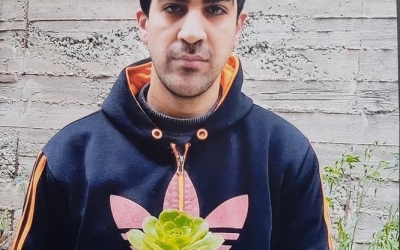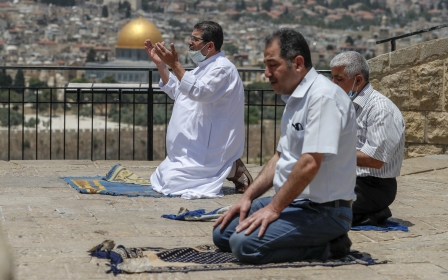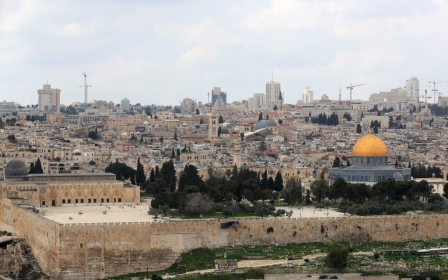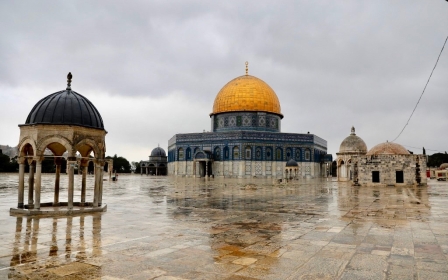Coronavirus: Thousands pray at Al-Aqsa after more than two months
Thousands of Palestinians prayed in Al-Aqsa Mosque on Sunday, as the compound, Islam's third-holiest site, reopened following a 69-day closure due to measures taken to prevent the spread of the novel coronavirus.
Israeli and Palestinian authorities have eased the lockdown in recent days following a decline in Covid-19 infections.
According to the mosque director, Omar Kiswani, nearly 3,500 Muslim worshippers performed the morning prayers in different areas of the compound, with social distancing measures enforced.
"I opened the gates of the mosque today with tearful joy," he told Middle East Eye.
"This is the Al-Aqsa we know, full of Muslim worshippers, but we have urged them to adhere to all preventive guidelines to ensure their safety," Kiswani said.
New MEE newsletter: Jerusalem Dispatch
Sign up to get the latest insights and analysis on Israel-Palestine, alongside Turkey Unpacked and other MEE newsletters
There have been 17,000 coronavirus cases and 284 deaths in Israel, and 386 cases and three deaths in the occupied West Bank.
Later on Sunday, Israeli police arrested dozens of Palestinians, as a heavily guarded group of settlers was escorted into the compound, a provocative move as Othordox Jews are barred from entering the site for fear of exacerbating tensions.
Among those arrested was journalist and MEE contributor Sondos Ewies, who said she was detained despite showing her press card, and was accused of taking part in riots.
Ewies was later released on condition that she would be barred from entering the Al-Aqsa site for a week. The ban may be extended for another six weeks, an officer told her during interrogation.
Eyad al-Halak
The reopening of the mosque comes a day after Israeli soldiers in occupied East Jerusalem shot dead an unarmed special needs Palestinian man after alleging that he was armed.
Eyad al-Halak, a 32-year-old from Wadi al-Joz, Jerusalem, was the second Palestinian killed in two days.
Halak's family told Haaretz that their son, diagnosed with autism, was unarmed, and "wasn't capable of harming anyone".
Hundreds protested against Halak's killing on Saturday evening outside Jerusalem's police headquarters and in Tel Aviv, carrying signs in Hebrew that read "police violence kills" and "Justice for Eyad".
Another Palestinian, Fadi Adnan Qaad, was shot dead by Israeli soldiers on Friday while he was driving his car in the occupied West Bank. The Israeli army said the driver accelerated in the direction of a number of soldiers and hit their bench, but they managed to get out of the way.
Qaad's family denied he attempted to carry out an attack, and said he was on his way to pick up his wife and children.
Israeli Army Chief of Staff Aviv Kochavi issued an alert to army commanders over possible violence in the occupied territories earlier this week after Prime Minister Benjamin Netanyahu again confirmed his plan to annex parts of the West Bank, according to Israeli media.
Tensions have flared in recent weeks as a result of the annexation announcement, with the Palestinian Authority halting all agreements and understandings with Israel and the United States, including security coordination.
Arab states, the United Nations and European countries have warned against the Israeli move, which would annex the land Palestinians seek for a state.
Middle East Eye delivers independent and unrivalled coverage and analysis of the Middle East, North Africa and beyond. To learn more about republishing this content and the associated fees, please fill out this form. More about MEE can be found here.





